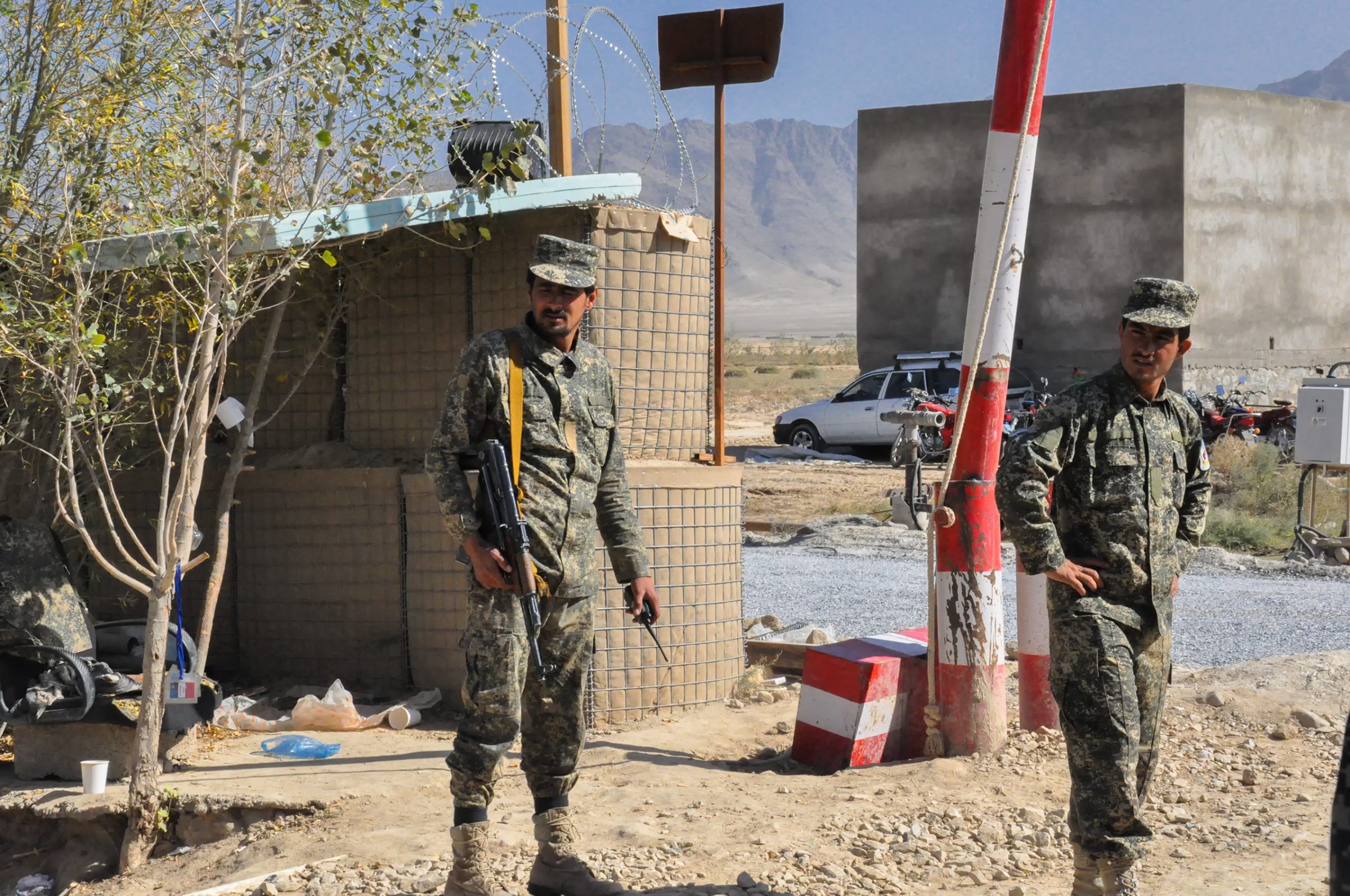China’s Non-Intervention in Afghanistan
As the current stage of conflict in Afghanistan works its way towards a conclusion, China needs to decide its role in the country’s future. Within Afghanistan there is growing frustration about China’s hedging, while across the neighborhood there is a growing sense of concern about China’s more aggressive posture. This will likely have a knock-on effect within Afghanistan and ultimately create blockages to stability within the country. This is a loss for everyone.
Kabul is losing out on support from its biggest and most powerful neighbor, while Beijing is missing an opportunity to showcase its potentially positive influence to the world with a country desperately in need of it.
Beijing has for the most part been a quiet actor in Afghanistan. It has played a role in most aspects of the country’s development in the past decades – from helping host negotiations, offering economic investment (including what on paper is the country’s biggest ever single investment in Mes Aynak), aid, military capacity building in the form of light weapons, base construction and training, and even working with strategic rivals like the United States to achieve stability in the country. In addition, China has engaged with a number of multilateral configurations around Afghanistan, and spoken repeatedly of bringing the country into Xi Jinping’s Belt and Road Initiative (BRI). Kabul and others have welcomed this activity, with the Afghan government ensuring that it does all that it can to keep Beijing happy, eager to get it to follow through on its promises.
Yet, notwithstanding consistent activity, Beijing has never lived up to its promise. As Afghanistan’s richest and most influential neighbor, there was an underlying expectation that China would be able to play a more significant role in the country. But this has never quite materialized as was hoped. Instead, China has studiously hedged, continuing to offer the potential for engagement but never quite following through.
In economic terms, Chinese companies’ investments into the country are the biggest that Afghanistan has ever seen. The much discussed Mes Aynak copper mine was awarded to a Chinese consortium of MCC and Jiangxi Copper in 2007 with an initial price tag of $3 billion attached to it, while CNPC won a tender to develop oil fields in Amu Darya in 2011 with the promise of $400 million in investment. The companies drove the investments, but were strongly supported by Beijing as they were seen in part to reflect a sense of China doing its bit for Afghanistan. At the time, voices in the U.S. expressed anger that China was once again taking advantage of the mineral opportunities created in the wake of American-led invasions (a similar story played out in Iraq with CNPC winning oil tenders in that country), but this was balanced by a sense in Washington that it was not a bad thing for China to step into a more stabilizing role in a country from which the U.S. wanted an exit strategy.
The projects, however, have made little further forward progress. Repeated issues have been thrown up around Mes Aynak, including security concerns, an archaeological dig atop the site, problems with locals complaining about land compensation, access to appropriate chemicals, and a persistent effort by the company to redefine the terms of the project that they had initially signed up to. In March 2016, the lead Chinese state owned enterprise working on the project, MCC, announced the decision to reallocate funds that had been raised to support the project elsewhere in the company.
In the north of Afghanistan, a similar story has played out. In 2011, Chinese energy giant CNPC signed a contract in conjunction with the Watan Group, a local Afghan firm, to exploit an oil field in Amu Darya in the north of the country. The project was one that was spotted by the company’s engineers in Turkmenistan working on the same oil field on that side of the border. Yet, since the agreement, the project has also been beset with problems. Disputes between the Watan Group and CNPC, between both companies and the Afghan government, and most dramatically between the company’s engineers and local potentates who reportedly deployed armed men to threaten the engineers when they had not received what they felt was their adequate compensation. Additionally, there has been little evidence of progress in the construction of a refinery which was initially discussed when the company won the concession. The entire project has also now reportedly been put into deeper suspension as the Afghan government has sought to strip the Chinese firm of its contract and run the project itself.
Beyond this, China has talked repeatedly about including Afghanistan into the Belt and Road Initiative, though this has also failed to move forwards. There has been discussion of linking Afghanistan to the China-Pakistan Economic Corridor (CPEC), though this seems to have met with resistance in Islamabad. A fiber optic cable link has been mooted from China to Afghanistan through the Wakhan Corridor. A survey was launched in 2018 by the Afghan government, but the project appears to be slow in moving forwards. The project is part of a broader World Bank regional CASA digital initiative, reducing Beijing’s commitment to the project. Reflecting the low connectivity, according to a 2019 UNCTED report, China was the only border country with which Afghanistan did not have a terrestrial fibre optic cable link.
None of this ultimately reflects the real opportunity that China could offer Afghanistan. Look at neighboring Pakistan, Central Asia or Iran where Chinese firms are active across the economy and the government regularly touts massive deals. Not all come through, but enough that the economic geography of all of Afghanistan’s neighbors is increasingly turning towards Beijing.
In political and military terms – China has played a role in negotiations, but never chosen to step into a forward role to force parties to the table. Discussion of China acting as a ‘security guarantor’ to any agreement has not generated concrete outcomes, and most Chinese security activity in Afghanistan has been focused on securing the small part of the country that touches China. Beijing has strong links to Islamabad, the Taliban and the Afghan government – yet, has not ultimately done much with these connections to generate actual outcomes in Afghanistan.
Instead, all evidence points to China strengthening and sealing off its direct and near borders with Afghanistan. It has provided military support to strengthen Tajik border posts and built its own base for its own forces there, equipment to Pakistani forces in Gilgit-Baltistan, and even reportedly helped develop a mountain base for Afghan forces in Badakhshan. The establishment of the Quadrilateral Cooperation and Coordination Mechanism (QCCM) which brings together the chiefs of military staff of Afghanistan, Pakistan, Tajikistan and China to focus on their shared border area, is the institutionalization of this approach.
The net result is that the actor with the widest range of potential positive links in the country, a relatively neutral history, and the greatest potential economic opportunity has not come forward to help Afghanistan in the way that it could. Rather, Beijing has sat back and watched. The narrative from many prominent Chinese experts remains one of Afghanistan being a” graveyard of empires.”
Yet now the conflict appears to be winding towards some sort of conclusion, the time would be ripe for China to finally step forwards and take a stronger and more positive role in the country. At a moment when Chinese international diplomacy is under assault, a good news story in Afghanistan might help with Beijing’s global image.
Unfortunately, it is unlikely that this will happen. While Beijing may simply be waiting out the result of the current negotiations, and hope that the subsequent likely coalition government may provide an effective partner to work with, the most likely outcome from the current negotiations will be messy and inconclusive. Violent actors are not going to go away, nor is a single faction going to be able to take control. NATO will continue its gradual withdrawal, while regional powers will focus on their individual border regions and interests. A vacuum will be left with various factions in Kabul struggling over their stakes.
The result is a loss for all concerned, with Afghanistan losing the most. And in a worst case scenario, the country could become a further location for conflict between China and its many adversaries in a new proxy war.
Raffaello Pantucci is a senior associate fellow at Britain’s Royal United Services Institute and a visiting senior fellow at the S. Rajaratnam School of International Studies in Singapore. His work focuses on terrorism, counter-terrorism and China’s Eurasian relations.




